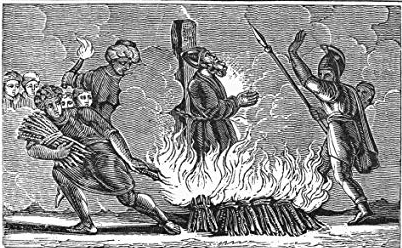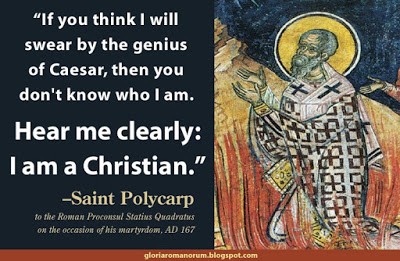
Was the message of the original apostles of Jesus passed on to the second generation of disciples after them without corruption?
Who are those disciples of the original apostles? What did they learn from the apostles? Do we have any evidence in writing outside of the Bible?
I had written one article about one of those second generation disciple, Ignatius. You can read it here.
In this article, let;’s look at a man named POLYCARP. He was a student of the apostle John. That makes him a vital LINK to the original apostles for he had been personally taught by John!
Polycarp lived between 69 AD to 155 AD. His teacher, John, one of the 12 original disciples, died around 100 AD. Since Polycarp is a direct link to the an eyewitness of Jesus, we can study his writings to see his teachings. We have preserved a letter he wrote to the Philippians. Yes, the same Philippian church that is mentioned in the Bible.
What do you think he wrote to them? Did he condemn Paul? Did he say anything that deviates or contradicts the writings of the New Testament? Did he quote any non-canonical sources outside of the New Testament? Did he quote from Scriptures?
You can read Polycarp’s letter to the Philippians here .
Polycarp’s letter includes quotes and phrases from Matthew, Mark, Luke, Acts, Romans, 1 and 2 Corinthians, Galatians, Ephesians, Philippians, 1 and 2 Thessalonians, 1 and 2 Timothy, Hebrews, 1 and 2 Peter, 1 John, 3 John and Jude. Almost from every book in the New Testament. Nothing from any heretical sources, nothing from any forged “gospels” like the Gospel of Thomas, etc.
This is strong indication that the early church already accepted the Gospels, Acts, and the Epistles as inspired Scripture.
Remember this was almost 200 years BEFORE the council in 325 AD. Many Muslims allege that the Bible was created by Emperor Constantine and the council of Nicea. This is patently false.
In the letter, Polycarp quotes from the gospels and mentions Paul in endearing terms . Nothing contradicts our New Testament. Some of the things Polycarp writes about Jesus coming in the flesh, bearing our sins, dying on the cross, and rising again from the dead,, how Christians are saved by grace and that Jesus will ultimately be the judge of mankind.
At the end of his life, he was brought to the stake to be executed by being burnt to death. He was given an opportunity to recant by the Roman proconsul who took pity on him. The Roman official told him all he had to do to be set free was to reject Jesus and confess “Caesar is Lord,” and offer an incense to Caesar’s statue.
Polycarp responded: “Eighty-six years I have served Christ, and He never did me any wrong. How can I blaspheme my King who saved me?”
So his fate was sealed to die by being burnt. One historical account records that the flames arched over his head. When the Roman guards realized that Polycarp was not being burned quickly enough, they stabbed him with a spear until he died.
